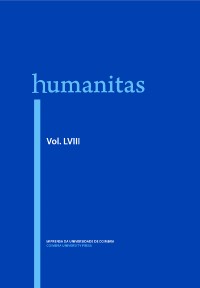Please use this identifier to cite or link to this item:
https://hdl.handle.net/10316.2/28088| DC Field | Value | Language |
|---|---|---|
| dc.contributor.author | Silva, Maria de Fátima | - |
| dc.date.accessioned | 2014-01-27T16:18:35Z | |
| dc.date.accessioned | 2020-10-02T23:09:57Z | - |
| dc.date.available | 2014-01-27T16:18:35Z | |
| dc.date.available | 2020-10-02T23:09:57Z | - |
| dc.date.issued | 2006 | - |
| dc.identifier.issn | 2183-1718 | - |
| dc.identifier.uri | https://hdl.handle.net/10316.2/28088 | - |
| dc.description.abstract | In her play about Helen, Rancor, Hélia Correia, as usual in her dramatic productions, puts in evidence the role of the Nurse. In its conventional lines, the Portuguese author follows Euripides as her source; she puts her maidservants in connection with their mistresses and shows the great influence they have in the fate of the house they belong to. In Helia they become a true daemon, a kind of shadow behind a human being, in life and death. | eng |
| dc.language.iso | por | - |
| dc.publisher | Faculdade de Letras da Universidade de Coimbra, Instituto de Estudos Clássicos | - |
| dc.subject | Ama | por |
| dc.subject | Helena | por |
| dc.subject | releituras do mito | por |
| dc.title | A ama: um motivo clássico no rancor de Hélia Correia | por |
| dc.type | article | - |
| uc.publication.collection | Humanitas vol. 58 | - |
| uc.publication.firstPage | 495 | - |
| uc.publication.lastPage | 507 | - |
| uc.publication.location | Coimbra | - |
| uc.publication.journalTitle | Humanitas | - |
| uc.publication.volume | 58 | por |
| uc.publication.section | Artigos | - |
| uc.publication.orderno | 27 | - |
| uc.publication.area | Artes e Humanidades | - |
| uc.publication.manifest | https://dl.uc.pt/json/iiif/10316.2/28088/259234/manifest?manifest=/json/iiif/10316.2/28088/259234/manifest | - |
| uc.publication.thumbnail | https://dl.uc.pt/retrieve/12022459 | - |
| item.grantfulltext | open | - |
| item.fulltext | With Fulltext | - |
| Appears in Collections: | HVMANITAS | |
Files in This Item:
| File | Description | Size | Format | |
|---|---|---|---|---|
| humanitas58_artigo27.pdf | 319.68 kB | Adobe PDF |  |
Items in DSpace are protected by copyright, with all rights reserved, unless otherwise indicated.
